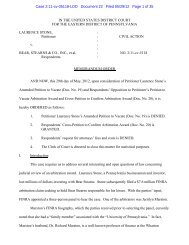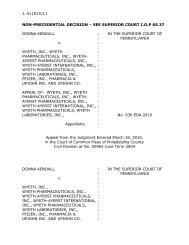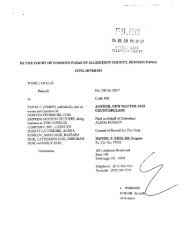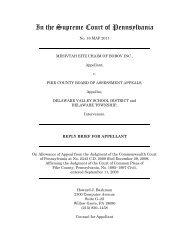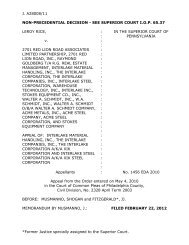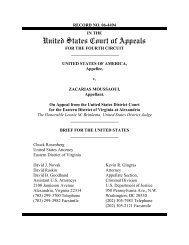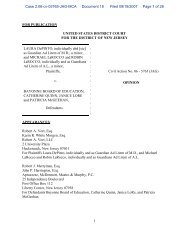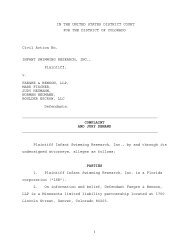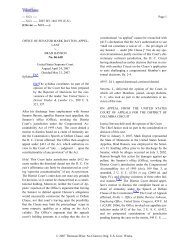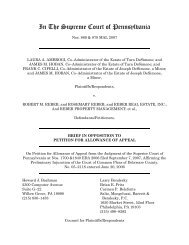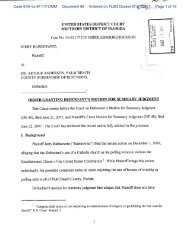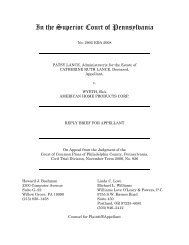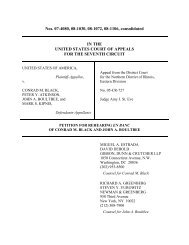In the Superior Court of Pennsylvania - How Appealing
In the Superior Court of Pennsylvania - How Appealing
In the Superior Court of Pennsylvania - How Appealing
You also want an ePaper? Increase the reach of your titles
YUMPU automatically turns print PDFs into web optimized ePapers that Google loves.
Defendants’ argument appears to be that a plaintiff must conduct a<br />
reasonable investigation into <strong>the</strong> cause <strong>of</strong> her injury in order to invoke <strong>the</strong> discovery<br />
rule, even if <strong>the</strong> investigation would not have revealed <strong>the</strong> cause <strong>of</strong> <strong>the</strong> plaintiff’s<br />
injury. <strong>In</strong> essence, defendants’ argument would require <strong>the</strong> plaintiff to engage in a<br />
fool’s errand — mandating <strong>the</strong> expenditure <strong>of</strong> valuable resources in <strong>the</strong> search for<br />
something incapable <strong>of</strong> being found — as a condition precedent for invoking <strong>the</strong><br />
discovery rule in any case. That is simply not what <strong>Pennsylvania</strong> law requires.<br />
As <strong>the</strong> <strong>Superior</strong> <strong>Court</strong>’s opinion correctly explains:<br />
Appellants contend fur<strong>the</strong>r that, even if Ms. Coleman and <strong>the</strong><br />
o<strong>the</strong>r Appellants suspected that HRT may have caused <strong>the</strong>ir breast<br />
cancer, “a diligent investigation” <strong>of</strong> <strong>the</strong> cause would not have led <strong>the</strong>m<br />
to reasonably conclude that hormone <strong>the</strong>rapy was <strong>the</strong> cause <strong>of</strong> <strong>the</strong>ir<br />
breast cancers. Appellants’ brief at 4. Appellants maintain that <strong>the</strong><br />
FDA apparently concluded when it approved Wyeth’s warnings that<br />
<strong>the</strong> majority <strong>of</strong> studies showed no increased risk. Id. at 26. Ms.<br />
Coleman’s doctors were unsure <strong>of</strong> <strong>the</strong> risk. The product information<br />
that came with <strong>the</strong> HRT medications did not advise <strong>of</strong> <strong>the</strong> risk and<br />
studies were inconclusive <strong>of</strong> any causal link or increased risk <strong>of</strong> breast<br />
cancer. Even Appellees’ own experts acknowledge that <strong>the</strong> literature<br />
showed no causal connection between HRT medications and breast<br />
cancer. For all <strong>the</strong>se reasons, we hold that <strong>the</strong>re are genuine issues <strong>of</strong><br />
fact as to whe<strong>the</strong>r, with <strong>the</strong> exercise <strong>of</strong> due diligence, <strong>the</strong> causal<br />
connection between HRT and breast cancer was knowable until <strong>the</strong><br />
results <strong>of</strong> <strong>the</strong> WHI study were revealed. Thus, summary judgment was<br />
improperly granted on this ground.<br />
Coleman, 6 A.3d at 520 (slip op. pp. 35–36). The <strong>Superior</strong> <strong>Court</strong>’s resolution <strong>of</strong> <strong>the</strong><br />
reasonable diligence inquiry consists <strong>of</strong> a fact–bound decision limited to <strong>the</strong>se cases<br />
and not some sweeping decision <strong>of</strong> general applicability.<br />
<strong>In</strong> a last ditch effort to attempt to salvage some relief, Wyeth and Upjohn<br />
argue that this <strong>Court</strong>’s forthcoming decision in Gleason v. Borough <strong>of</strong> Moosic, No. 7<br />
– 38 –



